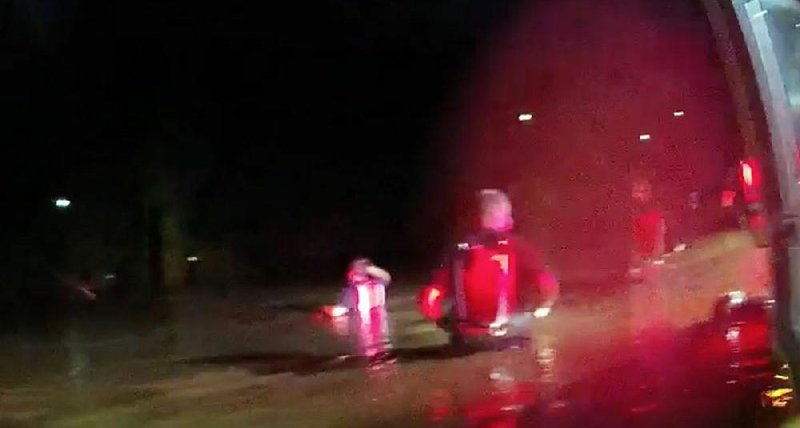FORT SMITH -- A review of the death of a woman who drowned in August while on the phone with a dispatcher suggests the Fort Smith Police Department make changes to hiring and oversight of 911 call operators.
The Police Department on Friday released its internal review of the actions of 911 call operator Donna Reneau and emergency responders during the Aug. 24 drowning of Debra Stevens, a newspaper carrier.
Stevens drowned in her car near 5801 Kinkead Ave. after torrential rainfall resulted in flash flooding throughout the city. About 4 inches of rain fell in just a few hours.
In the recording of the 911 call, which drew national attention, Reneau told Stevens to "shut up" and chastised her for driving into floodwaters.
Though the department received hundreds of phone calls saying that Reneau's actions were disrespectful to the dying woman, the review concluded that Reneau performed her duties as required.
"Despite the manner in which Reneau spoke to Stevens, I can find no indication of negligence in Reneau's actions in dispatching first responders, nor in the actions of those who responded to the scene," wrote Dean Pitts, the Police Department's deputy director of administration, who led the internal review.
Reneau had turned in her notice two weeks before Stephens' death, and Aug. 24 was her last day as a 911 operator. Reneau faced no criminal charges in the death.
Pitts wrote in his report that if Reneau were still an employee, she would face a review. Even if she had been found in violation of policy, "such a violation would not merit a measure of discipline as strict as termination," Pitts wrote.
[Video not showing up above? Click here to watch » https://www.youtube.com/watch?v=qhRGqseO-kA]
"When dealing with someone during a critical incident, particularly when the person is in hysterics, it is often necessary to take a stern or commanding tone, or to even raise one's voice," Pitts wrote.
"However, several of the statements made by Reneau certainly pass beyond the need to take control of the conversation. These statements would qualify as a violation of the City of Fort Smith Human Resources Policies ..."
Outlined in interdepartmental memorandums he sent Police Chief Danny Baker between Oct. 28 and Nov. 21, Pitts recommends the department:
• Create a "documented" hiring process for 911 operators;
• Hire two additional 911 operators to bring the call center into compliance with the recommendations of a 2018 staffing analysis;
• Request a panel of 911 operators to develop questions approved by human resources officials to ask new operator candidates;
• Hire at least three supervisors for the 911 call center so that one supervisor may be in the center at any time, especially during severe weather;
• Encourage operators to take training courses in flash floods and swift-water situations.
Four operators were working on the night Stevens died, the report said. The center had fielded 14 calls about stalled or flooded cars and 11 other calls between 2:55 a.m. and 4:36 a.m., when Stevens called. Another 19 calls about vehicles in floodwaters came in after Stevens' call had been answered. The summary said the center was "overwhelmed" by the number of calls.
In a phone interview with Pitts on Sept. 12, Reneau said she didn't think the water could have risen so quickly or that it could be more than 3 feet deep.
"Reneau said she had not had any training about flash floods or swift water, so she was not aware of how deep the flash floods could get or how quickly," Pitts wrote.
"... She regretted telling her she was not going to die most of all, but she also regretted not being more kind and understanding. Reneau said she realized she should not have said some of the things she did, but much of it was necessary to get Debbie's attention so that she could get important information from her."
Had a supervisor been in the room -- as Pitts suggested one always should be -- the supervisor could have noticed that Reneau was in distress, the report said.
Pitts also lamented the lack of training for both 911 call operators and police officers in swift-water rescue.
"Police officers are routinely dispatched to reports of vehicles stranded in high water, yet have no special equipment or training to conduct water rescue," Pitts wrote. He noted that water rescue is the least common call officers receive but can be especially dangerous.
Because police officers do not have the training or equipment to respond to swift-water rescues easily, Pitts suggested the Police Department be considered the "secondary" responding agency, with the Fire Department playing the foremost role in such rescues.
Pitts recommends that operators "should take advantage of any opportunities to obtain training" in high-risk scenarios like water rescue.
"Though rare, an operator would have a better understanding of the situation if they had undergone some basic instruction on the characteristics of swift water, flash flooding, and the hazards they present," Pitts wrote.
Current policy dictates that 911 operators not give directions to people in danger outside of such commands as "get to safety" and "stay on the line." Pitts suggested that operators who had been trained in specific areas of rescue should be allowed to recommend action.
Pitts also suggested that although the Police Department is adept at handling training police dispatchers, Fire Department personnel would likely have more knowledge to contribute to the training of freshly hired operators to work at the fire dispatch console.
"Currently the Fire department does not provide any assistance or training on topics specific to fire procedures," Pitts wrote. "Fire department personnel could help telecommunicators to have a greater understanding of fire procedures and dispatch protocol."
Fire Department personnel also would be better qualified to help train 911 center personnel better understand "critical incidents" that would be most appropriate for a Fire Department response, according to Pitts. This includes swift-water rescue and major structure fires.
Metro on 12/21/2019
